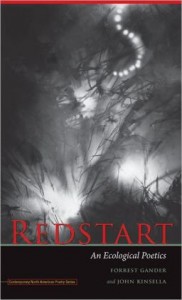Book Review
There is a long, rich tradition of “nature poetry,” of the poet turning to his or her surroundings and absorbing them for inspiration, attempting to capture the splendor of wilderness, or perhaps producing sonnets or haiku that reflect the peace the author finds in nature. Redstart, the collaborative effort of poets Forrest Gander and John Kinsella, however, seeks to dispense with this notion of the poet as somehow outside of nature and to abandon the damaging, potentially catastrophic idea of human domination. Their mission statement is that nature has long been viewed by humans as something to be exploited, and that “the destruction of habitat will stop only when people give up on the idea of getting something back.”
This exploitation would seem to include intangible notions like inspiration, whereby the author positions him or herself outside of nature and is mining it for a resource, albeit one of a different sort. Thus, we are meant to go beyond our preconceived notions of nature and its role in the global market economy, and to question even the “imposition of authorial control” and consequent construction of poetics as they reflect nature. Gander and Kinsella propose moving into new hybrid forms that reject the co-opting of nature for gain or advancement by breaking away from established tradition.
By backing away from the active manipulation of line breaks and form, the authors preserve a space divorced from commoditization. Gander and Kinsella pursue an organic form that straddles the two interrelated concepts of ecopoetics in application via text and environment. It would seem that the impetus for collaboration here would produce an arena not unlike the overlapping part of a Venn diagram where ecopoetics could function independent of imposition and extraction.
Though this independence is an impossibility, the paradox inherent in such an effort makes for moments of stunning brilliance, such as in the sometimes fractured narrative of “Codex for a Protest” where Gander and Kinsella write: “detail’s arbiter…Earth-turning lizards poke legs out of the shed…cosseting the evocative…the Australian Nationalist Movement / attacked us, KILL PUNKS.” Essays on ecopoetics (“A Note on Ecopoetics,” “The Carboniferous and Ecopoetics,” “The Future of the Past”) rub shoulders against “where nature flexes, burrows” and poems that do not require any title or designation, other than the author’s initials. As readers, we are both pulled toward and pushed away from meaning as we have been conditioned to understand it.
And yet, despite the move to inhabit more organic space, we cannot escape the fact that Forrest Gander and John Kinsella are accomplished poets, and signs of their craftsmanship are indelibly imprinted across the book. Numerous selections benefit greatly from the use of end rhymes, and no matter how far-flung the words on the page radiate from expected forms as a means of embodying the authors’ visions of ecopoetics, foundational aspects like iambs dot the book’s landscape. Even the lengthy prose sections frequently bring a certain flourish to straight non-fiction. While there may not fully be an answer to, “Can poetry be ecological?” Redstart is a fascinating attempt at exploring the depths of that query.
About the Reviewer
Jake Oliver is a New England native, born in Vermont and growing up in Maine. He has a BA in English from Union College (NY) and holds an MFA in Creative Writing with an emphasis in poetry from San Diego State University. He is currently enrolled in the doctoral program for creative writing at Aberystwyth University in Wales. He has also been writing music reviews for DecoyMusic.com since September 2009, and his literary work has appeared in several publications.
